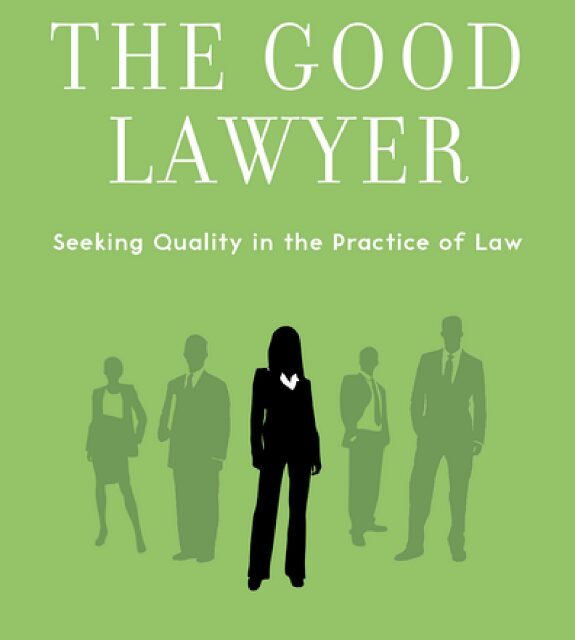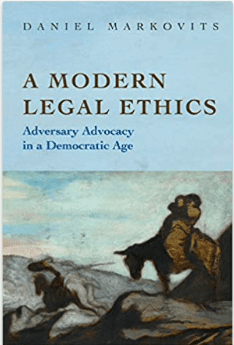Douglas O. Linder and Nancy Levit. THE GOOD LAWYER: Seeking Quality in the Practice of Law. Oxford University Press, 2014, with an enormous bibliography to be found in the footnotes. My exposition, commentary, and critique will be presented in several parts. This one is on background and foundations. There will be others; Part I should be read first, and I promise that the print size will be larger on the others I have sung the praises of this book briefly on more rapidly moving and accessible social media a couple of times in this blog, but I shall take a somewhat different approach.
Part I
THE GOOD LAWYER is a philosophical book as well as a study of prevailing psychology and the sociology of the legal profession. The study is true at least because it involves serious and deep evaluations of moral principles, both in the abstract and the applied model. I shall in this, Part I, assert some negative propositions about their general approach, but. . . .
Mostly, in the other parts, I shall very briefly give one sentence and one paragraph outlines of what they are doing, ask questions, and then occasionally dialogue with them in the abstract and argue with them, from time to time. This review may sound like a really negative sustained slamming of the book, but it is not. It is a discussion of its ideas from a critical standpoint. The book itself is very valuable–helpful, disquieting, and thought-provoking. Thus, it is a critique of the ideas only in the highest sense.
Background
The authors are two law professors who have stationed themselves at the University of Missouri at Kansas City Law School. The student body that has recognized what they have is a lucky crew. One of the themes of the book describes what a good idea it would be to have courses in law school resembling their book, and what a good idea it would be to study the legal vocation–and prepare for it–by having seminars on famous trials. Apparently Professor Linder, at least, teaches such a class, and references to it are found in the footnotes. (I believe, I remember taking a court from him on Environmental Law. He did a good job those some 40 years ago, but I bet this one is a knockout.)
What is interesting about Professor Linder’s “Famous Trials” materials is that there are actual first-hand materials provided. These materials are easily findable on the Net. Use his name, famous trial teaching materials pop up, and the primary source material is on the left. Here are at least some of them: 1692 Witch Trial, O.J. Simpson, Scottsboro, Charles Manson, Scopes, and no doubt there are (or will be) others. There are lots of books about these cases; it’s the primary sources that make his materials unique.
Foundations
The book starts in its Preface with a triad of concepts: good lawyers, great lawyers, and best lawyers. How do these fit together, especially the category great lawyer does not have a good lawyer as a necessary condition? What is it to be among the best lawyers? How is that hooked up with being a great lawyer? Shouldn’t the idea of being an excellent lawyer figure into this set somehow, making it a “quad-something”?
The concepts of good lawyers are central to the book. It appears to mean quality lawyer or high-quality lawyer. Does that work like this, something a lawyer more-or-less said to the NYT reporter when he investigated a non-lawyer fraudulently passing himself as an actual lawyer: “I can’t say Dickenson was a good lawyer, but he didn’t seem to be a non-lawyer.” It can’t; there have to be some poor lawyers or poor actual lawyers. So how is one to measure the distances up starting the poor, then reaching average, and then getting to good? (“Great” is a different matter, according to the authors, I guess.)
The book exemplifies an ideology through and almost through. The book virtually identifies being a good lawyer with being a “people’s lawyer,” a lawyer for downtrodden and/or threatened people and goodness in lawyering requiring resisting prevailing legal authority. Is this true? Can’t you be a good lawyer and be on the side of the establishment? Can a good lawyer be representing?
Can one be a good lawyer and represent the Klan for money? I confess that I would not like this lawyer; indeed, I would hold him in contempt; nevertheless, I might have to admit that he is a really good lawyer.
How should I feel about (evaluate, or judge) Clarence Darrow if he suborned perjury or hid evidence? Wouldn’t I still have to admit he was a good lawyer, with defects and vices? Are the authors guilty of confusing being a good lawyer with being a good person? Aren’t they wrong about this if they are doing it, as much as I like the idea? Can one be an evil person and be a good lawyer? Or partly a good person, but a truly excellent lawyer?
I say “through and almost through” because at one point they acknowledge that a corporate-type lawyer can be counted among good lawyers, but they seem to say–following Lawrence Lessig–that s/he can be (or he is likely to be ) a good lawyer only if he believes “the system works.” Works for everybody? Isn’t actually the truth that lots of big-biz lawyers believe the opposite; in other words, believe that the system is frequently unjust and that the wrong people and entities often win–not maybe at trial but the before and thereafter? Isn’t it also true that lots of BIG FIRM, lawyers among others give a damn about justice system-wide but think only about the interests of their own clients and how they can pursue them zealously, though always in accordance well with the applicable law and ethical rules? And certainly without flagrancy in any case.
Transitional Starting Point
The reader is reminded that I admire this book greatly. I am not trying to put it down much less trample on it. The truth is that I envy the lawyers who are “people’s lawyers,” and often wish I have pursued that course. I didn’t, and I feel guilty about it. I don’t like heading up plaintiff cases; the cycle of contingency fees is just too stressful, and the enormous expenses cause sleepless nights. I defended guilty criminals a couple of times, and had no hesitation about trying those cases but didn’t continue doing it for monetary reasons. I haven’t even supported what I take to be the right political party much because my wife would support the other one, and we would cancel each other out. I certainly lie to her about my political expenditures. No guilt there, just boring pragmatism. Nevertheless, most people would call me a good lawyer, at least, and they are right.
Another thing that turns me on about this book is the fact that it emphasizes the importance of storytelling as a form of at least persuasion. Some clients that are human persons may learn more about them than through illustrations of arguments. Family law matters are particularly like that, as are some personal injury cases. Sometimes it will work in front of juries, although I suspect that closing arguments in sophisticated patent cases are not their zone, although other IP cases may be.
So what do the authors want to say about a bloke like me? Am I not a counter-example to their major thesis? Aren’t there a lot like me?
The chapters of the book could be titled as follows: (1) Empathetic, (2) Courageous, (3) Having Willpower, (4) Integrated into the Legal Community, (5) Uses Both Intuition and Deliberative Reasoning, (6 ) Realistic, (7) Client’s True Interest, (8) Pursuit of Justice with Integrity, (9) Persuasive, (10) Fits with Professional Change.
Perhaps the two key references in the bibliography are:
- Jonathan Haidt, The Righteous Mind: Why Good People Are Divided By Politics and Religion (2012).
- Daniel Kahneman, THINKING FAST AND SLOW (2011). [Works by him and his major research partner are to be found in the bibliography of this book–geniuses, both of them.]
- Robert M. Pirsig, ZEN AND THE ART OF MOTORCYCLE MAINTENANCE: AN INQUIRY INTO VALUES (2009) [The book–a sort of philosophical quasi-novel/quasi-memoir, really–was written long ago, reflecting the outlook of the 60s and then published in 1974 of the 20th century, and it has that feel to it. Pirsig’s father was a Law Professor and Dean, Pirsig himself studied “Eastern philosophy” at length but also had serious mental difficulties or disorders.]
Strangely, and mistakenly, I think: the works of Roger Fisher, et al, such as GETTING TO YES and the volumes following it, are not really acknowledged.





Recent Comments